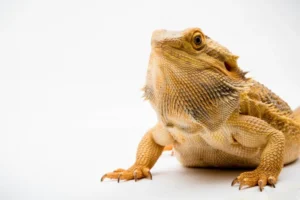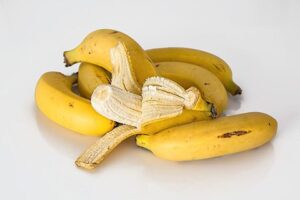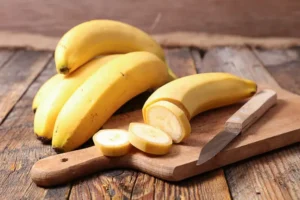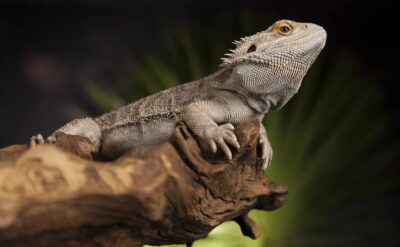When it comes to caring for your bearded dragon, knowing what they can and cannot eat is crucial for their health and well-being. One common query among reptile enthusiasts is, “Can bearded dragons eat banana?”
Understanding the dietary habits of these fascinating creatures is essential to ensure a balanced and nutritious diet. Let’s delve into the world of bearded dragon nutrition and explore whether bananas make a suitable addition to their menu.
Can bearded dragons eat bananas?

Yes, bearded dragons can eat bananas, but they should be offered in moderation. Bananas are a good source of vitamins and minerals, including potassium, vitamin C, and vitamin B6. However, they are also high in sugar, and too much sugar can be detrimental to a bearded dragon’s health.
When feeding bananas to your bearded dragon, it’s important to peel the fruit and cut it into small, bite-sized pieces. This makes it easier for your dragon to eat and reduces the risk of choking. Additionally, bananas should be just one part of a varied and balanced diet for your bearded dragon.
Remember that a significant portion of a bearded dragon’s diet should consist of vegetables, with some fruit offered as a treat. It’s crucial to provide a diverse range of foods to ensure your dragon receives all the necessary nutrients for optimal health.
Always monitor your bearded dragon’s weight and adjust its diet accordingly. If you have any concerns or questions about your bearded dragon’s diet, it’s advisable to consult with a veterinarian who specializes in reptile care.
Is banana safe for bearded dragons?
In moderation, banana can be considered safe for bearded dragons. Bananas are a good source of certain vitamins and minerals, including potassium, vitamin C, and vitamin B6. However, they are also high in sugar, and excessive sugar intake can be harmful to bearded dragons.
When feeding bananas to your bearded dragon:
- Moderation is Key: Offer small amounts infrequently. Too much sugar can lead to health issues, including obesity and metabolic disorders.
- Remove the Peel: Be sure to peel the banana before offering it to your bearded dragon. The peel can be difficult for them to digest.
- Cut into Small Pieces: Cut the banana into small, bite-sized pieces. This makes it easier for the bearded dragon to eat and reduces the risk of choking.
- Varied Diet: Bananas should be just one part of a varied diet. Bearded dragons require a mix of vegetables, fruits, and insects to meet their nutritional needs.
Remember that individual bearded dragons may have different preferences and tolerances, so it’s essential to observe your pet’s reactions to new foods and adjust the diet accordingly. If you have any concerns about your bearded dragon’s diet or health, consult with a veterinarian who specializes in reptile care.
What nutrients do bananas provide for bearded dragons?

Bananas can provide certain nutrients for bearded dragons, but it’s essential to be aware of both the benefits and potential drawbacks. Here are some of the nutrients found in bananas:
- Potassium: Bananas are a good source of potassium, which is an essential mineral for various bodily functions, including muscle and nerve function.
- Vitamin C: Bananas contain vitamin C, an antioxidant that supports the immune system.
- Vitamin B6: This vitamin is important for metabolism and the proper functioning of enzymes.
- Dietary Fiber: Bananas contain dietary fiber, which can help support digestive health.
While bananas do offer these nutrients, they also come with some drawbacks when it comes to feeding bearded dragons:
- High Sugar Content: Bananas are relatively high in sugar, which, if consumed in excess, can contribute to health issues such as obesity and metabolic disorders in bearded dragons.
- Low in Calcium: Bearded dragons need a diet rich in calcium, and bananas are not a significant source of this essential mineral.
When incorporating bananas into a bearded dragon’s diet, it’s crucial to do so in moderation and as part of a well-rounded, balanced diet. Bananas should not be the primary source of nutrition, and a variety of vegetables, fruits, and insects should be included to ensure your bearded dragon gets all the necessary nutrients.
Always monitor your dragon’s health and consult with a veterinarian if you have any concerns or questions about its diet.
How often can bearded dragons eat bananas?
Bearded dragons can eat bananas occasionally, but it’s important to offer them in moderation due to their high sugar content. As a general guideline, you can offer small, bite-sized pieces of banana to your bearded dragon once every two weeks or once a month.
Remember that bananas should be just a small part of a varied and balanced diet for your bearded dragon. The majority of their diet should consist of a mix of vegetables, leafy greens, and insects to ensure they receive a wide range of nutrients.
It’s essential to monitor your bearded dragon’s overall health, weight, and behavior. If you notice any signs of digestive issues, changes in behavior, or weight gain, you may need to adjust the frequency of offering bananas or reconsider them as a treat.
As always, individual bearded dragons may have different preferences and tolerances, so it’s a good idea to observe your pet’s reactions to new foods and adjust the diet accordingly. If you have any concerns about your bearded dragon’s diet or health, consulting with a veterinarian experienced in reptile care is recommended.

Potential risks of feeding bananas to bearded dragons
While bananas can be a part of a bearded dragon’s diet when given in moderation, there are potential risks associated with feeding them to these reptiles:
- High Sugar Content: Bananas are relatively high in sugar. Excessive sugar intake can lead to health issues in bearded dragons, including obesity and metabolic disorders. It’s crucial to balance the intake of sugary fruits with other components of the diet.
- Imbalance of Nutrients: Bearded dragons require a specific balance of nutrients, including calcium and phosphorus, for proper bone health. Bananas are not a significant source of these minerals. If fed too frequently, bananas could contribute to an imbalance in the diet.
- Digestive Issues: Some bearded dragons may have difficulty digesting fruits, including bananas. This can lead to gastrointestinal issues such as diarrhea or constipation.
- Obesity: Due to their sedentary nature, bearded dragons are prone to obesity, especially if their diet is high in sugary or fatty foods. Regular consumption of bananas, which are relatively calorie-dense, can contribute to weight gain.
To minimize these risks, it’s important to offer bananas as an occasional treat and not as a staple in the bearded dragon’s diet. Always provide a varied diet that includes a mix of vegetables, leafy greens, and insects to ensure your bearded dragon gets the necessary nutrients for optimal health.
If you have concerns about your bearded dragon’s diet or health, it’s advisable to consult with a veterinarian experienced in reptile care for guidance tailored to your specific pet.
Alternative fruits to feed bearded dragons besides bananas
Bearded dragons can enjoy a variety of fruits as part of their diet, provided that they are offered in moderation. Here are some alternative fruits that you can consider feeding your bearded dragon:
- Berries: Blueberries, strawberries, raspberries, and blackberries are good choices. They are lower in sugar compared to some other fruits.
- Apples: Remove the seeds and core, and offer small, peeled, and sliced pieces of apple.
- Melons: Watermelon, cantaloupe, and honeydew can be given in small, bite-sized portions. Ensure that seeds and rinds are removed.
- Papaya: This tropical fruit is rich in vitamins and can be provided in moderation.
- Pears: Remove seeds and core, and offer sliced or diced pear as an occasional treat.
- Grapes: Cut grapes into small pieces to prevent choking, and offer them sparingly.
Remember to cut any fruit into appropriately sized, bite-sized pieces to prevent choking, and always remove any seeds, pits, or tough skins that may be difficult for your bearded dragon to digest. Additionally, fruits should only make up a small part of their overall diet, with the majority consisting of vegetables and protein sources, such as insects.
As always, monitor your bearded dragon’s health and adjust their diet based on their individual needs. If you have specific concerns or questions about your bearded dragon’s diet, consult with a veterinarian experienced in reptile care for personalized advice.
Conclusion
This page answers the question on can bearded dragon eat banana. While bananas provide some beneficial nutrients, they are also high in sugar. Feeding bananas occasionally as part of a varied diet, along with a mix of vegetables and insects, helps prevent potential health issues such as obesity and metabolic disorders.
Always monitor your bearded dragon’s overall health and consult with a reptile veterinarian for personalized dietary advice.

